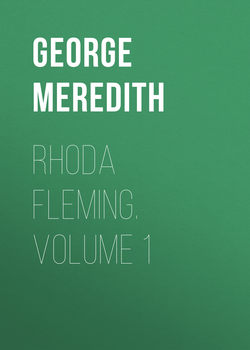Rhoda Fleming. Volume 1

Реклама. ООО «ЛитРес», ИНН: 7719571260.
Оглавление
George Meredith. Rhoda Fleming. Volume 1
CHAPTER I
CHAPTER II
CHAPTER III
CHAPTER IV
CHAPTER V
CHAPTER VI
CHAPTER VII
CHAPTER VIII
CHAPTER IX
CHAPTER X
CHAPTER XI
Отрывок из книги
Mrs. Fleming had a brother in London, who had run away from his Kentish home when a small boy, and found refuge at a Bank. The position of Anthony Hackbut in that celebrated establishment, and the degree of influence exercised by him there, were things unknown; but he had stuck to the Bank for a great number of years, and he had once confessed to his sister that he was not a beggar. Upon these joint facts the farmer speculated, deducing from them that a man in a London Bank, holding money of his own, must have learnt the ways of turning it over—farming golden ground, as it were; consequently, that amount must now have increased to a very considerable sum. You ask, What amount? But one who sits brooding upon a pair of facts for years, with the imperturbable gravity of creation upon chaos, will be as successful in evoking the concrete from the abstract. The farmer saw round figures among the possessions of the family, and he assisted mentally in this money-turning of Anthony's, counted his gains for him, disposed his risks, and eyed the pile of visionary gold with an interest so remote, that he was almost correct in calling it disinterested. The brothers-in-law had a mutual plea of expense that kept them separate. When Anthony refused, on petition, to advance one hundred pounds to the farmer, there was ill blood to divide them. Queen Anne's Farm missed the flourishing point by one hundred pounds exactly. With that addition to its exchequer, it would have made head against its old enemy, Taxation, and started rejuvenescent. But the Radicals were in power to legislate and crush agriculture, and "I've got a miser for my brother-in-law," said the farmer. Alas! the hundred pounds to back him, he could have sowed what he pleased, and when it pleased him, partially defying the capricious clouds and their treasures, and playing tunefully upon his land, his own land. Instead of which, and while too keenly aware that the one hundred would have made excesses in any direction tributary to his pocket, the poor man groaned at continuous falls of moisture, and when rain was prayed for in church, he had to be down on his knees, praying heartily with the rest of the congregation. It was done, and bitter reproaches were cast upon Anthony for the enforced necessity to do it.
On the occasion of his sister's death, Anthony informed his bereaved brother-in-law that he could not come down to follow the hearse as a mourner. "My place is one of great trust;" he said, "and I cannot be spared." He offered, however, voluntarily to pay half the expenses of the funeral, stating the limit of the cost. It is unfair to sound any man's springs of action critically while he is being tried by a sorrow; and the farmer's angry rejection of Anthony's offer of aid must pass. He remarked in his letter of reply, that his wife's funeral should cost no less than he chose to expend on it. He breathed indignant fumes against "interferences." He desired Anthony to know that he also was "not a beggar," and that he would not be treated as one. The letter showed a solid yeoman's fist. Farmer Fleming told his chums, and the shopkeeper of Wrexby, with whom he came into converse, that he would honour his dead wife up to his last penny. Some month or so afterward it was generally conjectured that he had kept his word.
.....
"It ain't adulterated. By what I read of your London beer, this stuff's not so bad, if you bear in mind it's pure. Pure's my motto. 'Pure, though poor!'"
"Up there, you pay for rank poison," said Anthony. "So, what do I do? I drink water and thank 'em, that's wise."
.....